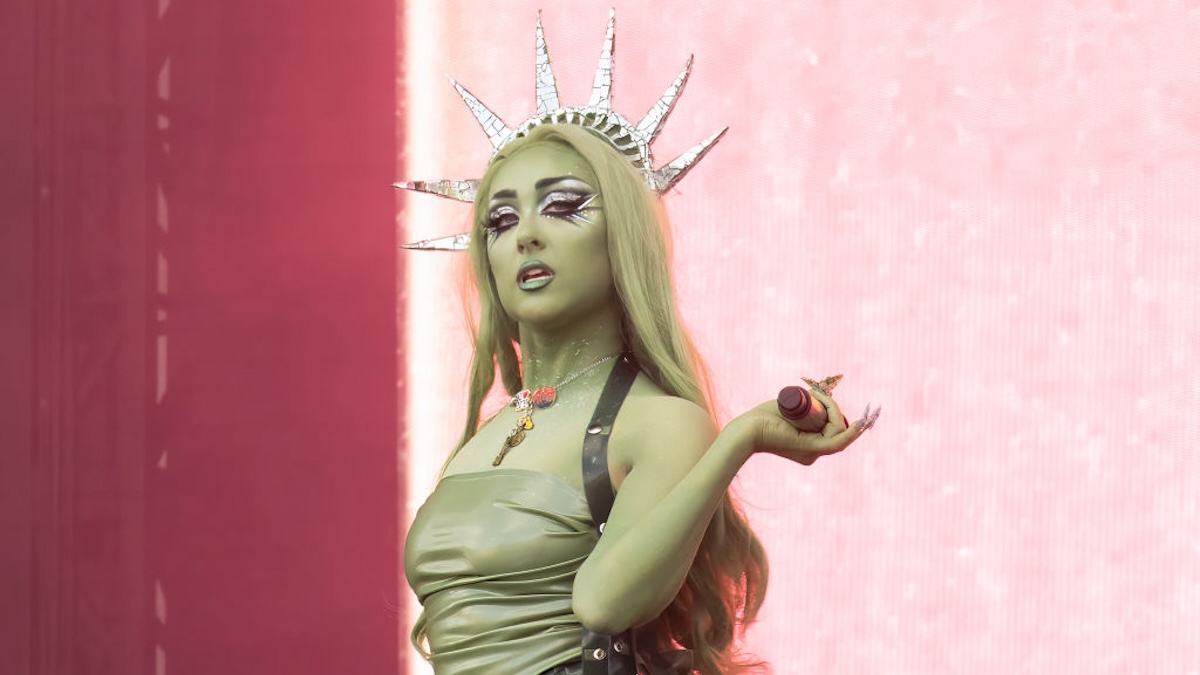Talk of Chappell Roan Being an ‘Industry Plant’ Doesn’t Make Sense

Between a viral dance trend, a headline-making late night TV appearance, and a series of increasingly iconic festival performances (and costumes) Chappell Roan has had no shortage of success in 2024.
The self-proclaimed “Midwest Princess” burst onto the indie pop scene last year with the release of her first full-length album, The Rise and Fall of a Midwest Princess. But such seemingly rapid, meteoric success has prompted plenty of new listeners to wonder: Is Chappell Roan an industry plant?
Well, hold on. There’s plenty of talk all over the internet about who is and who isn’t a so-called “industry plant,” but not a whole lot of clarification as to what actually makes somebody one. A label frequently thrown at artists like Clairo, Tramp Stamps, and Jennifer Lopez (among many others), an industry plant is an artist who fans believe has ascended to stardom thanks to the push of a label, rather than working their way up through the industry organically. Whether through nepotism, wealth, or industry connections and label favoritism, industry plants find mainstream success, but often at the cost of igniting plenty of discourse.
So, back to the matter at hand: Is Chappell Roan and industry plant, and if not, why are people rushing to label her as one? If you only tend to consume music through social media and the radio, it’s no wonder why some listeners may think Chappell is an industry plant; she’s popped up from seemingly out of nowhere and been everywhere from Jimmy Fallon to the Governors Ball, leading adoring crowds in H-O-T-T-O-G-O dances and donning dramatic, drag-inspired face paint.
But despite how quickly she’s seemingly burst into the mainstream over the past few months, Chappell Roan’s road to success in the music industry has been anything but short, and to call her an “industry plant” would not only be inaccurate, but discredit a hard-fought journey to get where she is today.
As with many other so-called “overnight sensations,” Chappell Roan’s musical career actually began on YouTube, all the way back in 2014. After posting original songs and covers under her real name (Kayleigh Rose), Chappell was signed by Atlantic Records in 2015, which was when she began performing under the stage name “Chappell Roan,” as an homage to her late grandfather. Chappell released her first single at Atlantic Records in 2017, followed by an EP, School Nights, that same year, but it wasn’t until 2020 that she started working with producer Dan Nigro, who helped influence and shape her sound into what it is today.
With Nigro helping songwrite and produce, Chappell released “Pink Pony Club” as what she hoped would be a drastic departure from her previous sound. “Pink Pony Club” was followed by two more singles, “Love Me Anyway” and “California,” and all three tracks embrace a distinctly bolder sound, with Roan drawing notable influences from LGBTQ+ culture in Los Angeles.
But despite the fact that Roan had found a new sound she was passionate about, she was dropped by Atlantic for the underperformance of her new trio of singles. After being dropped by her label, Chappell spent the next two years working odd jobs as a barista and a nanny, despite the glowing critical and fan reception to “Pink Pony Club.” Chappell eventually moved back to her hometown in Missouri and was working at a drive through while producing her music independently.
In 2020, Chappell moved back to Hollywood to take one last stab at cracking the industry, and though it took another two years of working more part-time gigs (like at a donut shop and as a production assistant), she inked a publishing deal with Sony and released her first single, “Naked in Manhattan,” under her new label. Another collaboration with Nigro, “Naked in Manhattan” (like “Pink Pony Club” and “California”), would eventually appear on Roan’s debut album, The Rise and Fall of a Midwest Princess, and was also the first time (but certainly not the last) Chappell explored queer and sapphic themes in her music.
“Naked in Manhattan” was the first in a series of singles that would mark the true beginning of Chappell’s so-called “overnight” rise to stardom. Between the likes of “Red Wine Supernova,” “Hot To Go,” and “Femininomenon” (all of which went viral to some degree on TikTok), her singular aesthetic, powerful vocals, and clever lyrics garnered a cult following, which would in turn lead to her celebrated run of festival performances and her time opening for Olivia Rodrigo on the Guts World Tour.
Following the 2023 release of The Rise and Fall of a Midwest Princess and her increasing popularity thanks to the Guts tour, Chappell finally found her way onto the charts with “Good Luck, Babe!” which debuted at number 77 on the Billboard Hot 100. Between the viral success of her singles, her memorable festival performances, and her unapologetically outlandish late night appearances, Chappell Roan’s breakout success in 2024 might seem indicative of industry insider meddling, but the reality of her career couldn’t be further from it.
It may have taken 10 years, but Chappell Roan is finally getting her flowers.
Have a tip we should know? tips@themarysue.com